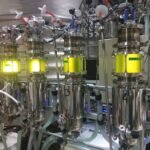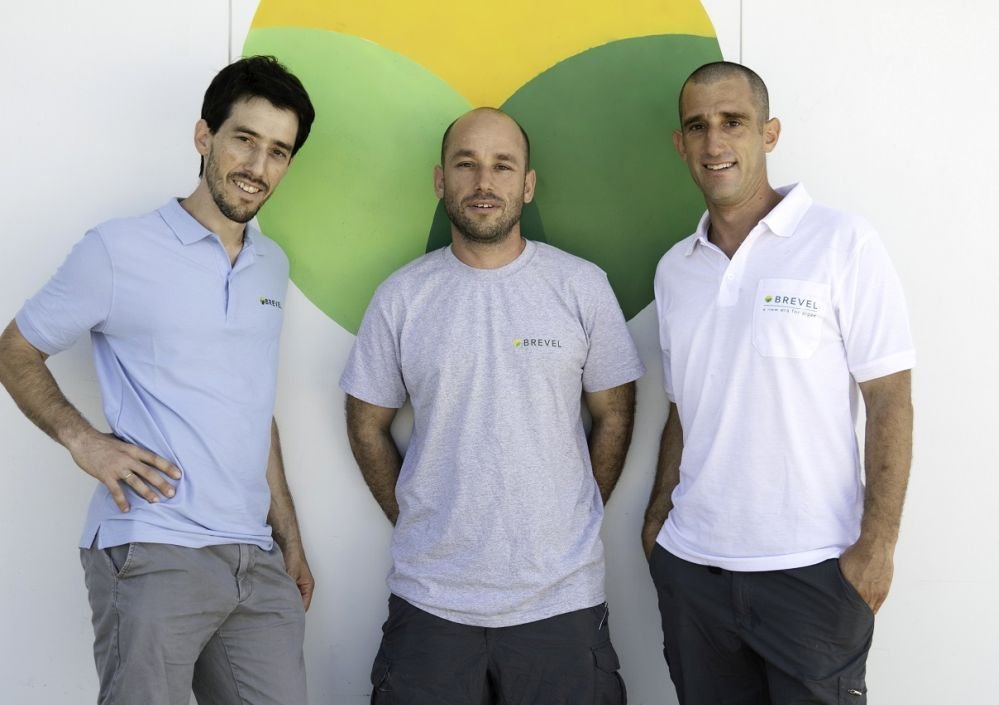
Israel’s largest beverage company CBC Group—a national franchiser of global brands including Coca-Cola and Carlsberg—has teamed up with Israeli startup Brevel to develop functional beverages and dairy alternatives containing protein, oils and antioxidants from microalgae.
Under a 10-year purchasing agreement, Brevel will supply CBC with its algae-derived ingredients, grown in a novel system in southern Israel with the capacity to produce hundreds of tons of neutral-tasting, highly-functional algae protein it claims will ultimately be able to compete with pea and soy protein.
The Israeli startup, which was founded by Yonatan (CEO), Ido (CTO), and Matan (COO) Golan in 2016, completed a $18.5 million seed round last summer—supported by CBC Group—to help finance the new 27,000sq ft plant.
The site will produce a “steady supply of a white powdered 60-70% microalgae protein concentrate” and a range of high-value co-products, Yonatan Golan told AgFunderNews: “Our protein is superior to soy and pea protein in terms of flavor and color, plus it’s non-allergenic and much more sustainable in terms of water and land usage as well as CO2 emissions.”
“Brevel’s groundbreaking approach gives us the opportunity to explore new categories and solutions and opens new doors in terms of the range of exciting consumer applications we can offer.” Lihi Rothschild, head of innovation, CBC Group

Scaling up algae production
Algae is an exciting source of food and nutrition, with some firms cultivating it outdoors in open ponds or in glass tubing to make ingredients such as spirulina and astaxanthin. Others produce lipids such as omega-3 DHA indoors via ‘dark fermentation’ (ie. without light).
However, attempts to make an economically viable food protein from algae have been less successful, according to Brevel, which claims to have developed a high-yielding process combining LED lighting and sugar-based (‘dark’) fermentation.
Brevel’s process yields a neutral-tasting complete protein and co-products including carotenoids, fibers, and polar lipids.
Brevel uses a non-GMO chlorella strain that is “GRAS approved [in the US] and not considered a Novel Food by EFSA,” added Golan. “However, we need to go through the regulatory process for the ingredients extracted from it. We are already in progress in this process.”
According to Golan, the light “does not alter the DNA in any way, but induces the microalgae to produce functional proteins, functional lipids, pigments simply because the photosynthetic complex is active and not dormant as would be the case in dark fermentation.”
Unique process combining ‘dark’ fermentation with sugars and LED lighting
In a recent interview, Golan acknowledged that Australian startup Provectus Algae and companies such as Algalif, Vaxa, and Yemoja “have taken the outdoor photobioreactors indoors and are using LEDs instead of sunlight for a more controlled process.”
While this is ideal for high-value ingredients such as nutraceuticals and cosmetics, he claimed, the unit economics don’t make sense for protein.
Firms using ‘dark’ fermentation, meanwhile, typically focus on “omega-3 DHA, which does not require light, and is a relatively high-value product, or they aim for yellow/golden/white chlorella biomass as a food additive for high-end products,” he claimed. “But the overall value you can extract from the microalgae is very limited and therefore, as a protein source they are simply unable to reach price targets relevant for the mainstream food industry.”
By combining fermentation and light in a single process, Brevel can “produce biomass with fermentation at yields 100 times higher than light-based cultivation and produce all of the commercial value and quality that comes from having light in the process,” he claimed.
The protein produced by Brevel is also “very different from that produced by dark fermentation as it is much more functional,” he said. “A lot of the functionality comes from proteins produced in the photosynthetic complex such as RuBisCo, and the content is much higher. Additionally, light enables the production of valuable co-products alongside protein which significantly increase profitability.”
That said, new players are emerging with approaches they claim can address some of the challenges Golan outlined, including Australian startup Algenie, which is developing novel thin layer photobioreactors enabling dramatic improvements in efficiency and scalability.
The post Brevel teams up with Israel’s leading beverage co to develop microalgae-fueled products appeared first on AgFunderNews.
